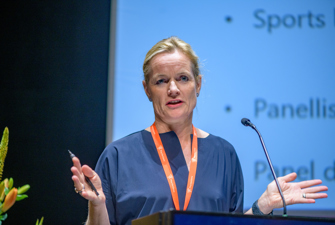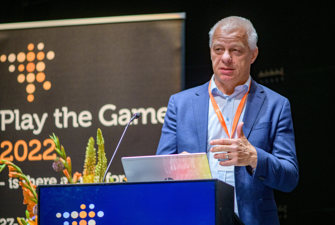Political campaign for a world anti-corruption agency launched at the European Parliament
European and North American experts in anti-corruption support German MEP Viola von Cramon-Taubadel’s attempt to set up an independent watchdog organisation that can investigate and sanction corrupt sports leaders worldwide.
Three decades after the 1992 publication of the British bestseller “The Lords of the Rings”, in which investigative crime reporters Andrew Jennings and Vyv Simson became the first journalists to expose corrupt members of the International Olympic Committee (IOC), a member of the European Parliament has finally taken up the challenge and decided to try and investigate and sanction corrupt sports leaders.
At an event in Strasbourg on 4 October, Viola von Cramon-Taubadel, a German member of the European Parliament for the Green Party, launched a campaign to set up a world anti-corruption agency (WACA) akin to the World Anti-Doping Agency (WADA) that was established two decades ago.
The idea of creating a WACA is not new. Investigative German journalist Jens Weinreich and Play the Game’s international director Jens Sejer Andersen have promoted the idea for more than a decade without much political attention.
But the new political campaign in Europe is motivated by a recent study of the many corruption cases that have haunted national and international sports organisations for the past decades, including sportswashing in autocratic states such as Russia and Qatar.
“I firmly believe it is time to put an anti-corruption agency back on the agenda for this reason alone,” said Grit Hartmann, an investigative German reporter and author of the new study, at the event in a discussion with a panel of European and North American experts in the field of anti-corruption in sport.
The German MEP will now use Hartmann’s 55-page report to seek national and international political support for setting up an independent watchdog organisation that has a mandate to investigate and sanction sports corruption worldwide.
“It was a good start, a good kick off,” von Cramon-Taubadel said after the event in Strasbourg.
“Hopefully we will have a hearing soon targeting the questions we have raised in the study but definitely we will have a Tour de Europe where we will present our study in different capitals and talk to our colleagues in national parliaments, human rights organisations, athlete representatives, and prosecutors.”
A remarkable shift in public awareness
In the executive summary of the new report on corruption in sports, Hartmann states that in the last decade, elite sport has lost much of its appeal and educational value.
The sports system is no longer primarily associated with its central promise of bringing people together on a level playing field, she says, but perceived as a rather toxic field where all sorts of corruption can thrive; bribery and embezzlement, money laundering, ticket fraud, vote buying, vote rigging, abuse of power, undue influence peddling, and abuse of athletes or match-fixing.
“None of this is new, but a remarkable shift in public awareness has taken place. Rather than to push blame onto individuals, such as athletes caught in a doping test, the crises are now being attributed to the stewards, the top-administrators, and the way they run sport,” Hartmann is arguing.
Furthermore, the German reporter is pointing to the fact that sports officials are players in a global market worth around 350 billion Euro in 2021 and have set the stage for grand corruption “by associating themselves with autocrats around the globe”.
In an era where elite athletes increasingly are joining the criticism, banding together in independent associations, because they feel exploited in an opaque system of which they are supposed to be the heart, Hartmann argues that corruption in sport can thrive because sport and its criminals cross borders and are allowed to operate in a global society of autonomy.
“They are accountable to no one. They are entitled to completely regulate their sports, while promoting them as businesses to earn billions, on the basis of an accepted autonomy. That is, without oversight,” Hartmann notes.
She adds that sports officials “hold an almost mystical sway over policy makers” around the globe because they control an area so many people care about.
“Clearly, self-regulation does not work. Rather, the interest in not damaging the revenues of one’s own product wins out. Corrupt practices are not followed up even if they are exposed. The lack of enforcement is evident in all types of sports corruption.”
Sports corruption is no less damaging than doping
To Hartmann there is little reason to believe that corruption is less damaging to the integrity of global sport than doping. And corruption, she says, is no less rooted in the specifics of the sports system than doping.
“Just as governments once helped to build an alliance against doping, now an alliance against corruption in sport is needed. Sport, and the many honest actors in it, be it officials or athletes, need political support in order to regain credibility and appeal.”
Only a certain level of integrity will, Hartmann argues, in the eyes of many European citizens justify the public funds that governments invest into sports organisations, whether to promote elite sport or to organise international competitions.
“It is time to change the rules of engagement, to put the autonomy of sport on a new footing, and reorganise it around accountability and transparency, rather than just allowing the next new scandal to emerge piecemeal.”
Hartmann’s study scrolls through the upper echelons of global sports to illustrate the specifics and the extent of sports corruption, discusses the legal framework for combatting sports corruption, and recommends EU policy makers to take the lead in the creation of a world anti-corruption agency based on an anti-corruption code that must be binding throughout global sport for all stakeholders.
WADA composition a mistake not to be repeated
The German reporter suggest that alignment with accepted standards and prevailing social norms, can include aligning the WACA Code with relevant conventions such as the UN Convention against Corruption (UNCAC), the UN Convention against Transnational Organised Crime (UNTOC) as well as the OECD Convention on Combating Bribery of Foreign Public Officials in International Business Transactions, the OECD Guidelines for multinational enterprises, and the Council of Europe Convention on the Manipulation of Sports Competition (The Macolin Convention).
Hartmann also believes that in the process of establishing WACA it is important to avoid a flaw that continues to harm WADA’s credibility more than 20 years after its inception thanks to conflicts of interest caused by a fifty-fifty share of power between the Olympic Movement and the governments of the world.
The investigative German reporter labels the composition of WADA’s Foundation Board and Executive Committee as an “inherent lack of independence” and a mistake not to be repeated.
“The WACA, with a focus on fighting corruption, would probably target more sports officials than WADA ever has. Therefore, the WACA should not be controlled, let alone be run by personalities from sports organisations,” Hartmann argues.
She recommends that recent or current ties to sports organisations must be an exclusion criterion at the executive level of a WACA and that sports organisations should not appoint more than a third of the non-executive members of the WACA Board.
EU has real muscles to regulate the sports industry
In 2006, Jens Sejer Andersen presented a similar idea of an anti-corruption agency at a conference organised by the Council of Europe and UEFA. Back then, his proposal was met with silence. But at the event in the European Parliament, he welcomed von Cramon-Taubadel’s initiative by saying:
“The European Union is one of the few governmental actors in the field that has real muscles and the possibility to regulate the sports industry. The heart and the backbone of the sports industry and the sports movement is in Europe, and what happens with EU legislation is decisive for what can happen internationally. The US government has taken some good initiatives that has an impact, but the EU is still very important.”
Paulina Tomczyk, general secretary of EU Athletes, stated she was happy to see athletes being included in the discussions of the proposed WACA from the beginning:
“The zero-tolerance approach that we often hear about in anti-doping and match-fixing just applies to athletes. An anti-corruption agency would have to target someone else than the athletes,” Tomczyk said, adding that athletes have their careers destroyed because of match fixing or doping while the people who put them in this position are not held responsible.
Maximillian Klein, a representative from Athleten Deutschland, said there is a need for integrated approaches to integrity threats in both national and international sport:
“At the international level we talk about monopolies, federations who are rule makers and dominate the lives of athletes but cannot be touched. They are untouchable. Therefore, athletes in Germany are most welcoming of this proposal to establish an independent oversight organisation.”
Match fixing expert: Talk less, act more
Declan Hill, a North American journalist and academic who is an expert on match fixing in sport, urged European and Canadian politicians to stop talking and act like the Americans in the fight against corruption in sport, including sportswashing:
“The sportswashing regimes and their enablers have misguided and misdirected us. We need to chase out the sportswashing regimes from sports integrity. We need to protect our young people. Sports are in danger. We need a world anti-corruption agency.”
Steve Menary, a British reporter and academic who is also an expert on match-fixing, said that the ongoing discussion on corruption in sport will be the same in ten years from now if no one starts to create WACA. Asked about the global scale of match-fixing, he said:
“There are billions of dollars out there. It’s money from organised crime. They are washing it through online betting websites. There are thousands of these websites. It’s a massive problem.”
Miguel Poiares Maduro, a Portuguese professor of law at the European University Institute, also supported the WACA initiative by saying that the failures in the governance of sports organisations are not only expressing themselves in the multiple integrity and corruptions problems:
“They are also undermining the capacity for the sports organisations to pursue the public goods that they claim they are pursuing in the area of sports.”
MEP Viola von Cramon-Taubadel has stated that the WACA should not be based in Switzerland which is home to many international sports federations but in a European country “with a robust justice system and traditions of respect for the rule of law, strong law enforcement and a culture of accountability.”
WADA was created in 1999 by the IOC and the governments of the world in the aftermath of the Festina doping affair during the 1998 Tour de France. Five years later the first World Anti-Doping Code was in place. WADA’s headquarter is based in Montreal, Canada.

